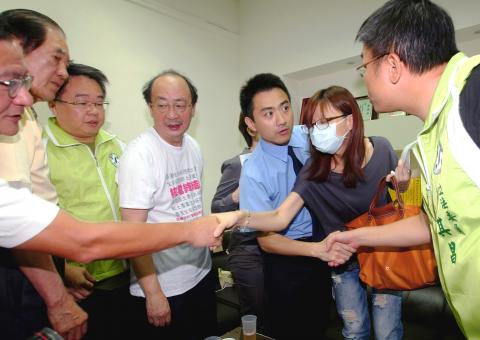|
Court martial
amendment prioritized
CONCILIATORY MOVE: After Saturday’s mass
protests over the Hung case, the amendment is to top the agenda of the extra
legislative session, rather than the referendum
By Chris Wang / Staff reporter

Hung Tzu-yung, sister of army
corporal Hung Chung-chiu shakes hands with members of the Democratic Progressive
Party caucus as she seeks to garner support for amendments to the Code of Court
Martial Procedure during an extra legislative session yesterday.
Photo: CNA
Under tremendous public pressure following
the death of army corporal Hung Chung-chiu (洪仲丘), the Chinese Nationalist Party
(KMT) caucus yesterday agreed to make amending the Code of Court Martial
Procedure (軍事審判法) the top item on the agenda of the extra legislative session.
The amendment, if passed, would transfer jurisdiction of some military criminal
cases, such as abuse, to the civilian judiciary during peacetime.
By removing the referendum proposal over the construction of the Fourth Nuclear
Power Plant as its top priority, KMT caucus whip Lin Hung-chih (林鴻池) said that
the party would not push the proposal for the remainder of the extra session and
that the KMT never intended to bundle the two issues.
However, Lin said the nuclear referendum proposal is still an important issue
and the KMT would not rule out convening a third extra session to handle it.
The KMT’s concession was likely in part due to the mass rally on Saturday in
which up to 200,000 people protested against what they said was the military’s
poor investigation into the Hung case.
Democratic Progressive Party (DPP) caucus convener Ker Chien-ming (柯建銘) said
that his party welcomed the KMT’s conciliatory move.
The DPP has insisted that all legal cases in peacetime should be handed to
civilian prosecutors and opposed the KMT’s two-phase plan to revise related
military laws, arguing that the plan could end up accomplishing nothing after a
prolonged process.
Transferring all military legal cases in peacetime to civilian prosecutors would
require the amendment of several pieces of legislation, including the Code of
Court Martial Procedure, the Code of Criminal Procedure (刑事訴訟法), the National
Security Act (國家安全法), the Criminal Code of the Armed Forces (陸海空軍刑法), the
Criminal Code and the organic law of the Ministry of National Defense.
The Taiwan Solidarity Union (TSU) also supported the amendment and said that the
change would not affect military training and capability.
TSU caucus convener Hsu Chung-hsin (許忠信) said the party would vacate the podium
if the KMT agreed not to bundle the amendment and the nuclear referendum
proposal, but reiterated that the TSU opposed convening a third extra session.
Hung Chung-chiu’s sister, Hung Tzu-yung (洪慈庸), yesterday visited all legislative
caucuses to garner support for the amendment, with her attention focused on the
KMT caucus, which had insisted that the nuclear referendum proposal was still
its No. 1 priority.
KMT Secretary-General Lai Shyh-bao (賴士葆) also created controversy as he said the
DPP was the party that was blocking the amendment of the military law.
“If it was not the DPP, which has tried to block a vote on the referendum
proposal since the beginning of the extra session by occupying the podium, the
amendment would have been screened and passed,” Lai said.
In related developments, after negotiations yesterday, the KMT and DPP caucuses
agreed to drop a proposed amendment over the referendum in the current
legislative session, which ends today. Soon afterward, DPP legislators began
removing their sleeping bags and items they had used to block the podium at the
legislature.
The next regular session is scheduled to begin on Sept. 17
Legislators also agreed that 16 more public hearings should be held before the
service trade agreement is screened in the legislature.
|
![]()
![]()
![]()